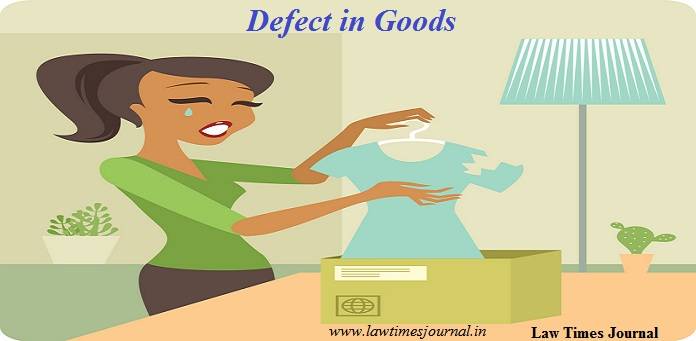Table of Contents
Analysis of defects in goods and services
Introduction:
As per the Consumer Protection Act,2019 Goods and Services are defined in the Section 2 (21) and 2(42) respectively.
Goods include movable property of every kind which also include food except the ones for resale or commercial purposes.
Section 2(42) states the service as service of any description which is made available to potential users and inclusive of services such as banking, transport, telecom, financing, insurance, processing, supply of electrical or other energy, boarding or lodging or both, housing construction, entertainment, amusement or the purveying of news or other information; which also does not include the services without consideration or under contract of personal service.
Consumer Protection Act defines the Defects and Deficiency as:
Defects means any imperfection or fault in the quantity, quality, purity, potency or standard which is required to be maintained by or under any law for the time being in force or under any contract, express or implied or as is claimed by the trader in any manner whatsoever in relation to any goods or product and the expression “defective” shall be construed accordingly.
Deficiency means any imperfection or fault or inadequacy in the manner, nature or quality of performance which is required to be maintained by law for the time being in force or has been undertaken to be performed by a person in pursuance of a contract or otherwise in relation to any service and includes-
- any act or omission resulting in negligence by such person which causes loss or injury to the consumer; and
- deliberate withholding of relevant information by such person to the consumer;
There was no provision in Consumer Protection Act,2019 which talks about the liability arises due to the deficiencies in Professional Services. But judiciary through the wider interpretation includes the services provided by a professional(Lawyer, Doctors, Charted Accountant, Architect, etc.) under the consumer protection act.
Service provided by Doctors:
In Indian Medical Association v V P Santha Supreme Court brought the medical profession within the ambit of a ‘service’ as defined in the Consumer Protection Act, 1986. The relationship between patients and medical professionals is stated as contractual. Doctors can be sued for compensation by the patients who sustained the injuries in procedure free courts of consumer protection.
The Court observed the services rendered by medical practitioners cannot be considered as contracts of personal service (which are excluded from the Consumer Protection Act). If the patients rendered their services free of charge or pay nominal fee, then the consumer protection act will not apply in that case. However, if patients’ charges are waived because of their incapacity to pay, they are considered to be consumers and can sue under the Consumer Protection Act.
It was held in the case of A S Chandra v Union of India that services rendered for consideration by private medical practitioners, hospitals and nursing homes must be construed as ‘service’ for the purpose of section 2(1)(o) of Consumer Protection Act and the persons availing such services were ‘consumers’ within the meaning of section 2(1)(d) of the act.
Services provided by Lawyers
In the case of D. K. Gandhi v M. Mathias, the National Consumer Dispute Redressal Commission observed that all professionals, including lawyers, shall come under the Consumer Protection Act. The National Commission stated the scope of section 2 (1)(o) of the Consumer Protection Act (definition clause of service) as very wide and till the time well established. It includes all the services except that of free of charge or a contract of personal service. Undisputedly, lawyers are rendering service and for which they are charging fees. It is not a contract of personal service.
Therefore, they should also be considered as services under Consumer Protection Act. It is also stated that a lawyer shall not be responsible for the favourable outcome of a case as the outcome does not depend merely upon the lawyer’s work. But, if there is any deficiency in rendering services promised and for which the consideration is received by him, then the lawyers may be proceeded against under the CPA.
In S Mahendran v Chirayinkil C. P. Badra Kumar, where advocate failed to file a suit; it amounted a deficiency in service on the part of the advocate. The complainant was held entitled to costs fixed by the NCDRC and was directed to be paid by the opposite party to the complainant within one month.
Services provided by Educational Institutions
Bhupesh Khurana And Ors. vs Vishwa Buddha Parishad, the National Commission held that, “When an educational institution imparts the education and charging the consideration, it falls within the head of ‘service’ in the Consumer Protection Act. Rendering of services is done by paying fees to the educational institutions for the purpose of getting education. If there is no rendering of service, question of payment of fee would not arise. The Complainants have paid the fees for hiring the services of the Respondent for consideration, therefore they would be considered as consumers as defined in the Consumer Protection Act.”
In a case, Registrar H.P university v Suresh Kumar, the Complainant was not able to get admission in a postgraduate degree because of the mistake of University which wrongly declared him unsuccessful. Therefore, the University was directed to pay the complainant, compensation to the complainant
Earlier in Consumer Courts, the orders have been passed that misleading advertisements by educational institutions can amount to an unfair trade practice and have even directed the institutions to stop such ads in the future.
Author: Mayank Malhotra,
Student, School of Law, Christ (deemed to be University) DELHI-NCR

